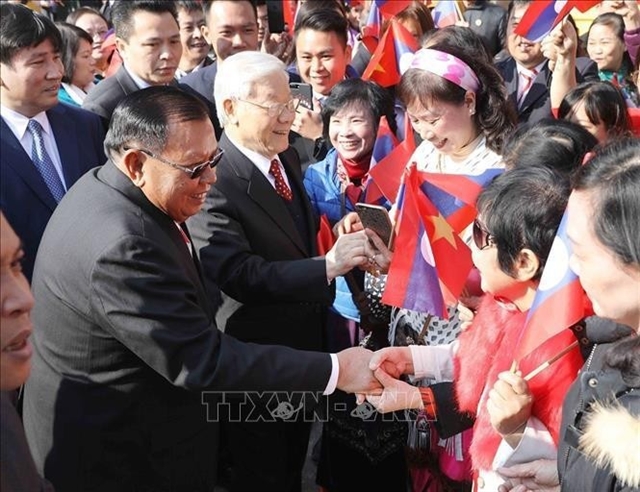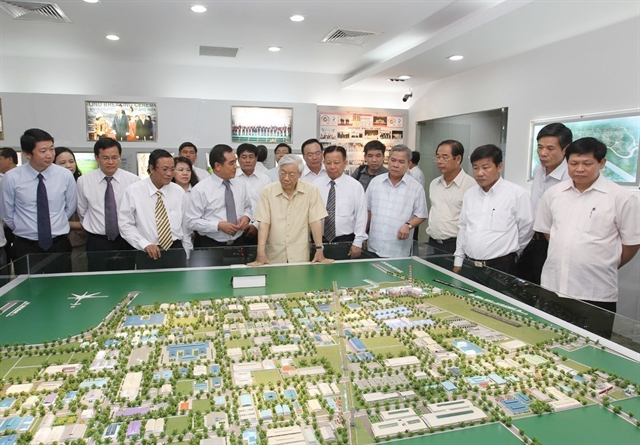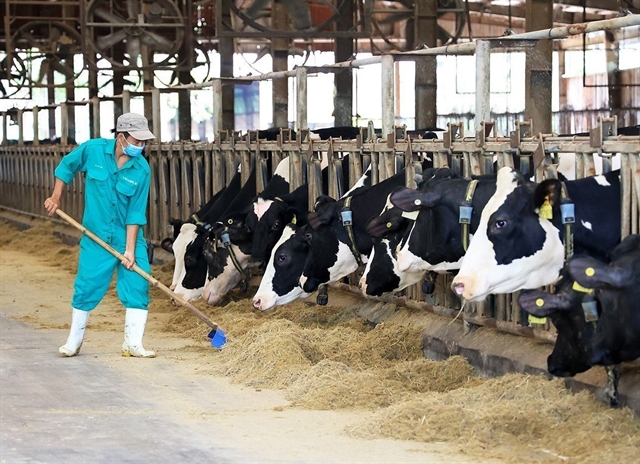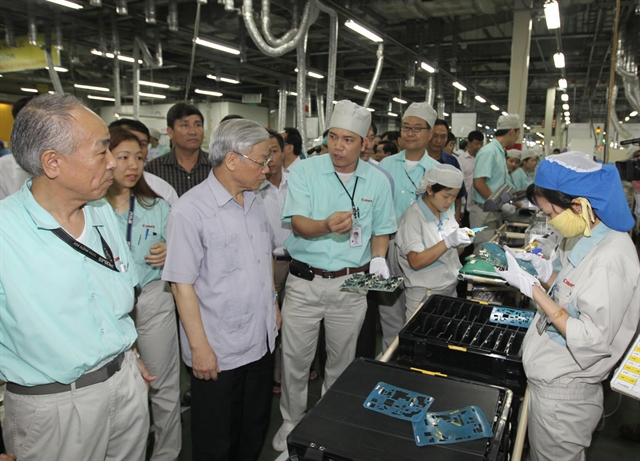 Politics & Law
Politics & Law

General Secretary of the Communist Party of Việt Nam Central Committee Nguyễn Phú Trọng passed away on Friday afternoon at the age of 80. During his 13 years of leadership, the Vietnamese economy has witnessed significant economic changes. Phạm Tấn Công, Chairman of the Việt Nam Chamber of Commerce and Industry, wrote an article about General Secretary Trọng's imprints on the country's economic developments.
 |
| Party Secretary General Nguyễn Phú Trọng visits Việt Nam - Singapore Industrial Park 1 in Bình Dương Province in April 2013. — VNA/VNS Photo Trí Dũng |
He wrote:
During 13 years holding the position as the country’s highest leader, Party General Secretary Nguyễn Phú Trọng has left imprints on the country’s major and important economic development orientations.
General Secretary Trọng signed three major resolutions promoting economic development on behalf of the Politburo and the Central Committee.
Those included the resolutions on private economic development, on selecting foreign investment and on building and promoting the role of Vietnamese entrepreneurs in the new era, generating important growth drivers for the Vietnamese economy, as well as demonstrating the Party’s sound national development orientations of the Party.
The Vietnamese economy reached US$435 billion as of the beginning of 2024, making Việt Nam the 35th largest economy in the world.
Making the private economy an important driving force
Faced with requirements for the country’s development, General Secretary Trọng, on behalf of the Central Committee, signed and promulgated Resolution 10-NQ/TW on June 3, 2017, on developing the private economy into an important driving force of the socialist-oriented market economy after the 5th conference of the 12th Party Central Committee.
The party in Resolution 10 has determined that " the private economy is an important driving force for economic development. The State economy, the collective economy, along with the private economy, are the core of developing an independent and autonomous economy.”
Accordingly, the resolution aimed to encourage and create favourable conditions for the private economy to develop rapidly, sustainably and register high growth rates in terms of quantity, scale, quality and contribution to GDP.
In the resolution, the Party also set specific goals for developing the private economic sector. The focus is on improving quality and business efficiency. The resolution aims to have at least 1 million enterprises by 2020, 1.5 million by 2025 and 2 million by 2030.
The growth rate of the private economy is higher than the general economic growth. The contribution of the private economy to GDP reached around 50 per cent in 2020, 55 per cent in 2025 and 60-65 per cent in 2030.
To promote the development of the private economic sector, the Party also raised a number of solutions to create a favourable investment and business environment, focusing on improving the private investment attraction policies and mechanisms and ensuring the operation of the private economy in accordance with the market mechanism.
In addition, the resolution also institutionalised and ensured strict implementation of business freedom, property ownership rights, civil rights and obligations of organisations and individuals in line with the provisions of the law.
Building a team of Vietnamese entrepreneurs
 |
| A diary farm of Vinamilk in Tây Ninh Province. — VNA/VNS Photo Hồng Đạt |
To develop an independent and self-reliant economy, from his first term as the Party’s top leader, General Secretary Trọng, on behalf of the Politburo, signed Resolution 09-NQ-TW on December 9, 2011, on building and promoting the role of Vietnamese entrepreneurs in the period of accelerating industrialisation, modernisation and international integration.
Continuing this spirit, 12 years later, the Politburo, under the leadership of General Secretary Trọng, issued Resolution 41-NQ/TW on October 10, 2023, on building and promoting the role of Vietnamese entrepreneurs in the new era with new and strong perspectives on developing our country’s team of Vietnamese entrepreneurs.
In resolution 41, for the first time ever, entrepreneurs were affirmed as holding an important position and role in the country's industrialisation, modernisation and international integration, building an independent and self-reliant economy as well as ensuring national defence and security.
The Party required efforts to create a favourable, safe, and equitable investment and business environment for entrepreneurs and businesses to develop and contribute. This was the first time “safety and equality” had been included in the requirements for improving the business environment, and it was largely welcomed by businesspeople.
Especially, the solution of “adding appropriate economic sanctions to handle violations, not criminalising economic relations…” demonstrated the vision of General Secretary Trọng and the Politburo in understanding the practical requirements and aspirations of entrepreneurs and businesses.
Resolution 41-NQ/TW set out a requirement to: “Promulgate a strategy to develop the national, sectoral and local entrepreneurial terms in line with the general goals, goals to 2030 and vision to 2025” and at the same time “Create breakthrough policies to form and develop national enterprises.”
These were new and strong orientations and a solution in line with the Party’s goal set for 2030 of building a team of Vietnamese entrepreneurs with the scale and capacity to meet the country’s economic goals.
By 2045, the resolution held that Vietnamese entrepreneurs would be formed with the scale, capacity, and qualification to meet national development goals with high income, position, and prestige in the regional and international arena. Some enterprises can affirm brands in the world market and lead a number of global and supply chains.
As of 2024, there are six Vietnamese businesspeople on the list of the world’s US dollar billionaires. According to a report by Henley & Partners and New World Wealth, there are about 19,400 millionaires with net assets of more than $1 million, 58 of whom have assets of more than $100 million.
In the 2013-23 period, the number of US dollar millionaires in Việt Nam increased by 98 per cent, or nearly doubled, exceeding the rate of China (92 per cent), India (65 per cent) and the US (62 per cent).
Selective with FDI
 |
| General Secretary Nguyễn Phú Trọng visits Canon Vietnam in 2011. — VNA/VNS Photo Trí Dũng |
Although the registered foreign direct investment (FDI) into Việt Nam reached record levels of $35.88 billion and $35.46 billion in 2017 and 2018, respectively, a number of problems arose regarding outdated technology and environmental pollution. In that context, the Party introduced the policy of being selective with FDI inflow.
On August 20, 2019, General Secretary Trọng, on behalf of the Politburo, signed and issued Resolution No 50-NQ-TW on orientations for improving institutions and policies and increasing the quality and efficiency of foreign investment cooperation by 2030.
The resolution is a strategic change in attracting FDI of Việt Nam, bringing the country to a period of being selective in FDI attraction with quality, efficiency, technology and environmental protection taken as criteria to attract capital.
Accordingly, priority was given to projects with advanced technologies, new technologies, clean technologies, modern management, high added value, spillover effects and connecting the global production and supply chains.
At the same time, the Party also identified the foreign-invested economic sector as an important component of the Vietnamese economy which should be encouraged and facilitated for long-term development, healthy cooperation and competition with other economic sectors.
This was the foundation for a series of technology 'eagles' to come and invest in Việt Nam and gradually form the domestic semiconductor industry ecosystem.
The foreign-invested sector is having increasingly important role to the Vietnamese economy and foreign investment has become an important growth driver of the country.
By 2023, there were more than 800,000 businesses in Việt Nam with about seven million business people.The private economic sector contributed nearly 45 per cent to the country’s GDP, one third of the State budget, more than 40 per cent of the total investment and created jobs for 85 per cent of the labour force.The private economy also plays an important role in international trade, accounting for 35 per cent of the total import value of 25 per cent of import value.With regard to foreign investment, Việt Nam has become an attractive destination for the world’s leading tech corporations. Việt Nam’s position in the international area is increasingly enhanced, just as the General Secretary repeatedly affirmed: “We have never had such a great fortune, potential, and international position and prestige as we have now.”After the Party issued Resolution 41-NQ-TW, the Government issued Resolution 66/NQ-CP on the action programme to develop at least two million enterprises by 2030.There are currently 70 enterprises with a capitalisation of more than $1 billion, 120 enterprises with revenue of more than $1 billion, 1,000 enterprises with pre-tax profits of more than $100 million, ten Vietnamese business people have been named in the world’s billionaire list and five in the list of the world's most powerful. The private sector will contribute 65-70 per cent of the country’s GDP. — VNS




